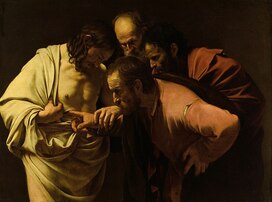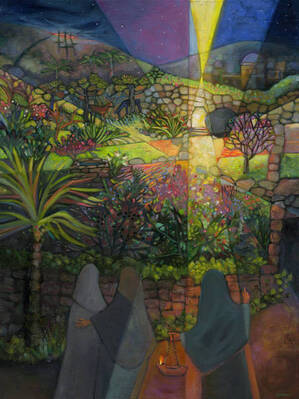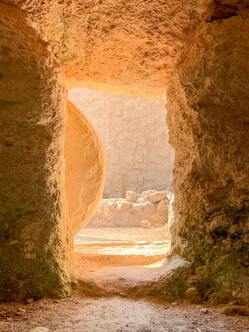 image: Kamala Bright on Unsplash
image: Kamala Bright on Unsplash
 image: Kamala Bright on Unsplash image: Kamala Bright on Unsplash ‘Tell me the old, old story, when you have cause to fear.’ Yes? No? Maybe? How do you respond to that: and, more broadly, to faith, and God, in Jesus, as story? Many years ago, on the radio, one of the radical thinking clergy of the Church of England was asked about how they understood God. ‘God’, they said, ‘is the poem in which I live my life.’ Yes? No? Maybe? Does that resonate with you? Many people, secular and faith-based, would be quite dismissive. Stories, and poems not least, they would say, are typically fanciful and not factual, fabricated and too often false. Of course, that kind of response generally lacks self-awareness and is very narrow, and, often, quite ideological. Apart from not recognising that different expressions of life have their own characteristics and validity, they typically miss the way in which story, metaphor, and symbol, exist within all areas of knowledge. Science for example is full of different models, and ideas like evolution are themselves stories. Scientists are right in saying that life-giving stories are helped by empirical verification. Yet, without stories as such, it is impossible for human life and consciousness to exist. That is something that liberals and progressives, especially in faith spaces, have often missed. It is not enough to point out the weaknesses in a tired traditionalist story: whether that be about creation, sexuality, or anything else. Even more importantly, we also need to tell a new story. Populist politicians, like rabble-rousing religious preachers, know this well. Facts are malleable but stories, once established, persist: whether they are particular ways of understanding the body, the nation, the world, and, of course, God. All of us therefore have stories, conscious and unconscious, running through our heads: some of them planted there long ago, some of them picked up from the latest social media frenzy; some of them giving life-giving purpose to our lives, others providing scripts that limit us but which are hard to shake off. What then is our story?...
0 Comments
 image: Brandy Martell, 400 block of 13th St near Frankland St, Oakland image: Brandy Martell, 400 block of 13th St near Frankland St, Oakland ‘Tell all the truth', wrote the poet Emily Dickenson, 'but tell it slant’. For ‘The Truth must dazzle gradually/Or every one be blind.’[1] That is pretty much Mark’s Gospel’s account of resurrection, isn’t it? Whilst other resurrection stories were attached later, the two earliest, and arguably the best, manuscripts of Mark’s Gospel stop abruptly at verse 8 of chapter 16, with women fleeing from an empty tomb and ‘saying nothing to anyone, for they were afraid.’ Furthermore, the text simply stops in mid-sentence, with the little preposition which means ‘for’. Mark’s Gospel, at least, is clear that resurrection is both truly astounding and impossible to convey straightforwardly. For how do we describe resurrection? How do we communicate resurrection? How do we live resurrection? The nature of resurrection is that it involves strange truths of transformation: which require, like so much great art, ‘telling it slant’; which rest on mystery; and which revolve around deep, lived, experience. For art, mystery, and experience: these three things are at the heart of the strange truths of resurrection we exult in today, as witnessed to by our readings and key images this morning, and the continuing life of you and I, and all who follow Christ…  image by Josh Eckstein on Unsplash image by Josh Eckstein on Unsplash Some of you may have noticed a change to our worship space today. The baby has gone – transformed it seems into a scallop shell. I am passing it around among you as I speak and I invite you to hold it for a few moments if you wish... ...Now, what strange alchemy is this, you may ask? What does this signify? We’ll come back to that. For now, just be aware that we are being subtly, and not so subtly, redirected, from the outer to the inner; from the seen to the unseen; from creation to re-creation; from the incarnation to the resurrection. This is a theological progression that demands that we go back to the beginning – to the creation of light in the story of Genesis as we heard, and to the beginning of the gospel as the author of Mark proclaims it just a couple of verses earlier than today’s text, ‘the beginning of the good news of Jesus Christ, the Son of God’...  image: The Incredulity of Saint Thomas by Caravaggio image: The Incredulity of Saint Thomas by Caravaggio Adjectives can be misleading and sometimes destructive. The former US President Donald Trump knows this particularly well. He deliberately chooses adjectives for his opponents. So we have had ‘LIttle’ Marco Rubio, ‘Lyin’ Ted Cruz, and, most notoriously, ‘Crooked’ Hillary Clinton. This both essentialises an alleged feature of a person whom Trump attacks and also contributes to a particular narrative about what matters. Trump leads in this. Yet he is not alone. Historically the Church has also done this, not least with our Gospel reading today. For if I asked most people for an adjective for Thomas, they would probably say ‘Doubting’. Indeed, throughout my life, I have generally heard today’s Gospel interpreted in only two ways. On the one hand, this story is told, typically by conservatives, as an encouragement to have true belief, and not to doubt. On the other hand, often somewhat defensively, liberals and progressives have spent much energy talking about the value of doubt. Now these approaches are really only two sides of the same, often quite distorting, coin. Instead, with recent voices from the margins, not least trauma-responsive theologians, how about we try viewing today’s Gospel text from a quite different standpoint? Instead of the framework of intellectual faith and doubt, let us take seriously the important bodily aspects of this story. Instead of obsessing about creedal truth, let us be attentive to wounds. Instead of focusing on the possibilities of the after life, we might reflect on what it means to live, together, after trauma. These, and very different aspects of Thomas, deliver us from unhealthy faith and offer pathways to healing for us all…  image: Jen Norton image: Jen Norton Easter Day sermons are hard to compose. How on earth do we speak of something as extraordinarily mysterious, and utterly transformative, as the Resurrection?! Part of me, and not just the liturgical Anglican, also wonders whether an Easter Day sermon is necessary at all – and maybe you feel the same, or will do after my particular words today?! After all, the Easter stories and symbolism are so rich, with so much food for thought and our spirits, as well as embodied proclamation of good news and the living Word of God. I can also only really remember two Easter Day sermons, and even their details are somewhat hazy. One I preached myself, in particularly lively circumstances: and that might be the starter for an Easter Reflection on another occasion. The other was on the first chapters of the book of Genesis and biblical critics’ theories of the Pentateuch. So that sermon was seemingly not even about Easter at all. Or was it?...  photo: John Canada on Unsplash photo: John Canada on Unsplash .A number of years ago, Penny and I were exploring the possibility of employment with a wonderful pioneering female bishop. In the course of her hospitality she introduced us to a fellow, nearby, bishop in case he also had a parish to offer us to work in. He however took one brief look at us, and, at once, abruptly asked ‘do you believe in the Resurrection?’ It was said in a very demanding, and almost accusatory, tone. Taken aback though we were, we actually responded very well, saying together, and in a somewhat incredulous tone, ‘why yes, of course!’ The bishop was nonetheless not at all impressed and exited immediately. For, of course, his question was not one to which he really expected an answer, or at least one in which he was actually interested. Like the notorious enquiry ‘when did you stop hitting your wife?’, it was a deliberately loaded question, containing its own assumptions. Like the Sadducees’ question to Jesus in today’s Gospel reading, it was also not really about resurrection at all. How often, I wonder, are our own questions like that too? When we talk in faith spaces, how much do our own interests intrude? How do we keep open to the mystery of resurrection?...  photo: Rachel Cook on Unsplash photo: Rachel Cook on Unsplash Do you identify with the conversion of Saul, later re-named Paul, which we hear read today? It does not fit us all. Yet it is certainly a striking story, which has powerfully influenced some, especially evangelical, Christian traditions. Indeed, it has sometimes become a classic model for becoming a Christian. It speaks, for example, of a remarkable repentance – or turning around, which is really what repentance means. It speaks of whole-hearted, whole-self transformation of life in Christ; and, above all, it speaks of the transforming power of God’s love and grace. All of this, we may say, are indeed important aspects of Christian Faith, and, as such, the story challenges us, like Saul/Paul, to consider the direction in which we are traveling and what is drawing us and companioning us on the way. All of these things also go to the heart of the sacrament of baptism which we were planning to share this morning. Unfortunately this has had to be postponed due to the baptismal candidate having contracted COVID-19. Nonetheless, it is still worth us reflecting today on the sacraments of baptism and of communion, which we do share together this morning. For, like Saul’s conversion, what do we make of them? How does God’s grace work through them, and in particular moments of our lives?…  photo: Mohamed Nohassi on Unsplash photo: Mohamed Nohassi on Unsplash How do we want our stories to end? Whether it is our own story, or that of our community, our nation, our world, much is up to us. Now, we may not have much room for manoeuvre. All kinds of forces help shape our lives, internal and unconscious, as well as external and recognised. Yet we still have power to shape our stories, even if only by our attitudes, and by how we receive and respond to what happens to us. This truth is at the very heart of the Gospel and the power of love, forgiveness, and justice seeking. For, however you view the Resurrection stories, a common feature is their open, unfinished nature. The tomb is not sealed. The body is not there or is transformed. The end is a new beginning. So how do we want the story to continue?...  image: Psit Heng on Unsplash image: Psit Heng on Unsplash “Early on the first day of the week, while it was still dark, Mary Magdalene came to the tomb” I want to teach any children here today a special and perhaps unfamiliar word – the word is ‘liminal’. Any ideas what it means?... I checked the dictionary, and it means, “occupying a position at, or on both sides of, a boundary or threshold”. Let me show you what that means. If you come forward here and put one foot on the step of the platform here at the front, and keep one foot on the floor, then you are standing on the threshold – right on the boundary – not on the platform, and not still on the floor either. You are in the liminal place... |
Authors
sermons and reflections from Penny Jones & Josephine Inkpin, a same gender married Anglican clergy couple serving with the Uniting Church in Sydney Archives
June 2024
Categories
All
|

 RSS Feed
RSS Feed